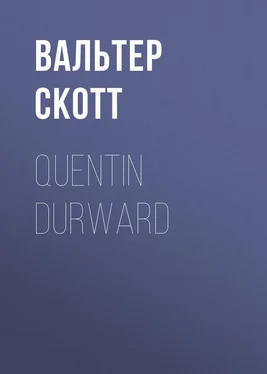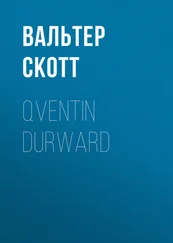Вальтер Скотт - Quentin Durward
Здесь есть возможность читать онлайн «Вальтер Скотт - Quentin Durward» — ознакомительный отрывок электронной книги совершенно бесплатно, а после прочтения отрывка купить полную версию. В некоторых случаях можно слушать аудио, скачать через торрент в формате fb2 и присутствует краткое содержание. Жанр: foreign_antique, foreign_prose, Альтернативная история, на английском языке. Описание произведения, (предисловие) а так же отзывы посетителей доступны на портале библиотеки ЛибКат.
- Название:Quentin Durward
- Автор:
- Жанр:
- Год:неизвестен
- ISBN:нет данных
- Рейтинг книги:3 / 5. Голосов: 1
-
Избранное:Добавить в избранное
- Отзывы:
-
Ваша оценка:
- 60
- 1
- 2
- 3
- 4
- 5
Quentin Durward: краткое содержание, описание и аннотация
Предлагаем к чтению аннотацию, описание, краткое содержание или предисловие (зависит от того, что написал сам автор книги «Quentin Durward»). Если вы не нашли необходимую информацию о книге — напишите в комментариях, мы постараемся отыскать её.
Quentin Durward — читать онлайн ознакомительный отрывок
Ниже представлен текст книги, разбитый по страницам. Система сохранения места последней прочитанной страницы, позволяет с удобством читать онлайн бесплатно книгу «Quentin Durward», без необходимости каждый раз заново искать на чём Вы остановились. Поставьте закладку, и сможете в любой момент перейти на страницу, на которой закончили чтение.
Интервал:
Закладка:
“Rich men may have their fancies, for they can pay for them,” said the landlord; “this is not the first time Maitre Pierre has found the true way to make gentlefolks serve at his beck.”
The young Scotsman felt somewhat offended at the insinuation; but, disguising his resentment, he asked whether he could be accommodated with an apartment at this place for a day, and perhaps longer.
“Certainly,” the innkeeper replied; “for whatever time he was pleased to command it.”
“Could he be permitted,” he asked, “to pay his respects to the ladies, whose fellow lodger he was about to become?”
The innkeeper was uncertain. “They went not abroad,” he said, “and received no one at home.”
“With the exception, I presume, of Maitre Pierre?” said Durward.
“I am not at liberty to name any exceptions,” answered the man, firmly but respectfully.
Quentin, who carried the notions of his own importance pretty high, considering how destitute he was of means to support them, being somewhat mortified by the innkeeper’s reply, did not hesitate to avail himself of a practice common enough in that age. “Carry to the ladies,” he said, “a flask of vernat, with my humble duty; and say that Quentin Durward, of the house of Glen Houlakin, a Scottish cavalier of honour, and now their fellow lodger, desires the permission to dedicate his homage to them in a personal interview.”
The messenger departed, and returned, almost instantly, with the thanks of the ladies, who declined the proffered refreshment, and, with their acknowledgments to the Scottish cavalier, regretted that, residing there in privacy, they could not receive his visit.
Quentin bit his lip, took a cup of the rejected vernat, which the host had placed on the table. “By the mass, but this is a strange country,” said he to himself, “where merchants and mechanics exercise the manners and munificence of nobles, and little travelling damsels, who hold their court in a cabaret [a public house], keep their state like disguised princesses! I will see that black browed maiden again, or it will go hard, however;” and having formed this prudent resolution, he demanded to be conducted to the apartment which he was to call his own.
The landlord presently ushered him up a turret staircase, and from thence along a gallery, with many doors opening from it, like those of cells in a convent; a resemblance which our young hero, who recollected, with much ennui, an early specimen of a monastic life, was far from admiring. The host paused at the very end of the gallery, selected a key from the large bunch which he carried at his girdle, opened the door, and showed his guest the interior of a turret chamber; small, indeed, but which, being clean and solitary, and having the pallet bed and the few articles of furniture, in unusually good order, seemed, on the whole, a little palace.
“I hope you will find your dwelling agreeable here, fair sir,” said the landlord. “I am bound to pleasure every friend of Maitre Pierre.”
“Oh, happy ducking!” exclaimed Quentin Durward, cutting a caper on the floor, so soon as his host had retired: “Never came good luck in a better or a wetter form. I have been fairly deluged by my good fortune.”
As he spoke thus, he stepped towards the little window, which, as the turret projected considerably from the principal line of the building, not only commanded a very pretty garden of some extent, belonging to the inn, but overlooked, beyond its boundary, a pleasant grove of those very mulberry trees which Maitre Pierre was said to have planted for the support of the silk worm. Besides, turning the eye from these more remote objects, and looking straight along the wall, the turret of Quentin was opposite to another turret, and the little window at which he stood commanded a similar little window in a corresponding projection of the building. Now, it would be difficult for a man twenty years older than Quentin to say why this locality interested him more than either the pleasant garden or the grove of mulberry trees; for, alas! eyes which have been used for forty years and upwards, look with indifference on little turret windows, though the lattice be half open to admit the air, while the shutter is half closed to exclude the sun, or perhaps a too curious eye – nay, even though there hang on the one side of the casement a lute, partly mantled by a light veil of sea green silk. But, at Durward’s happy age, such accidents, as a painter would call them, form sufficient foundation for a hundred airy visions and mysterious conjectures, at recollection of which the full grown man smiles while he sighs, and sighs while he smiles.
As it may be supposed that our friend Quentin wished to learn a little more of his fair neighbour, the owner of the lute and veil – as it may be supposed he was at least interested to know whether she might not prove the same whom he had seen in humble attendance on Maitre Pierre, it must of course be understood that he did not produce a broad staring visage and person in full front of his own casement. Durward knew better the art of bird catching; and it was to his keeping his person skilfully withdrawn on one side of his window; while he peeped through the lattice, that he owed the pleasure of seeing a white, round, beautiful arm take down the instrument, and that his ears had presently after their share in the reward of his dexterous management.
The maid of the little turret, of the veil, and of the lute sang exactly such an air as we are accustomed to suppose flowed from the lips of the high born dames of chivalry, when knights and troubadours listened and languished. The words had neither so much sense, wit, or fancy as to withdraw the attention from the music, nor the music so much of art as to drown all feeling of the words. The one seemed fitted to the other; and if the song had been recited without the notes, or the air played without the words, neither would have been worth noting. It is; therefore, scarcely fair to put upon record lines intended not to be said or read, but only to be sung. But such scraps of old poetry have always had a sort of fascination for us; and as the tune is lost for ever unless Bishop [Sir Henry Rowley, an English composer and professor of music at Oxford in 1848. Among his most popular operas are Guy Mannering and The Kniqht of Snowdon] happens to find the notes, or some lark teaches Stephens [Catherine (1794-1882): a vocalist and actress who created Susanna in the Marriage of Figaro, and various parts in adaptation of Scott.] to warble the air – we will risk our credit, and the taste of the Lady of the Lute, by preserving the verses, simple and even rude as they are:
Ah! County Guy, the hour is nigh,
The sun has left the lea,
The orange flower perfumes the bower,
The breeze is on the sea.
The lark, his lay who thrill’d all day,
Sits hush’d his partner nigh;
Breeze, bird, and flower confess the hour,
But where is County Guy?
The village maid steals through the shade,
Her shepherd’s suit to hear;
To beauty shy, by lattice high,
Sings high born Cavalier.
The star of Love, all stars above,
Now reigns o’er earth and sky;
And high and low the influence know
– But where is County Guy?
Whatever the reader may think of this simple ditty, it had a powerful effect on Quentin, when married to heavenly airs, and sung by a sweet and melting voice, the notes mingling with the gentle breezes which wafted perfumes from the garden, and the figure of the songstress being so partially and obscurely visible as threw a veil of mysterious fascination over the whole.
At the close of the air, the listener could not help showing himself more boldly than he had yet done, in a rash attempt to see more than he had yet been able to discover. The music instantly ceased – the casement was closed, and a dark curtain, dropped on the inside, put a stop to all farther observation on the part of the neighbour in the next turret.
Читать дальшеИнтервал:
Закладка:
Похожие книги на «Quentin Durward»
Представляем Вашему вниманию похожие книги на «Quentin Durward» списком для выбора. Мы отобрали схожую по названию и смыслу литературу в надежде предоставить читателям больше вариантов отыскать новые, интересные, ещё непрочитанные произведения.
Обсуждение, отзывы о книге «Quentin Durward» и просто собственные мнения читателей. Оставьте ваши комментарии, напишите, что Вы думаете о произведении, его смысле или главных героях. Укажите что конкретно понравилось, а что нет, и почему Вы так считаете.












